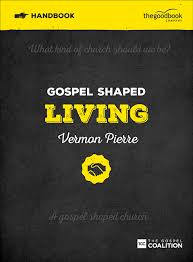This excerpt is adapted from Gospel Shaped Living, the third installment in the Gospel-Shaped Church curriculum co-published by TGC and The Good Book Company. Gospel Shaped Living was written by Vermon Pierre, pastor of Roosevelt Community Church in Phoenix.
Virgin Airlines boasts that it’s one of the most luxurious airlines in the world. If you fly first class with Virgin, you won’t be bumping elbows with the sweaty stranger squeezed next to you. Instead, you’ll have your very own private pod with massage functions and a fully reclinable seat. You’ll have on-demand satellite TV, on-demand WiFi, on-demand drinks and food. You’ll have a luxurious, pampered experience.
The advertising is appealing because it speaks the language of our culture.
Our world wants everything free and on demand. We want relationships with little to no commitment. If we make a commitment, we want it to last only as long as we’re “on board” with it. We want relationships—our friends, our family, our children—to be easy and “fully reclinable” so that they go in the direction we desire. We want to control our time so that we can earn more, or have more leisure for ourselves. And it’s very easy to think of sex almost entirely in terms of our own pleasure.
Even when we do “good things” like volunteer for a charity, we still want it to be “on demand,” according to our choice and convenience. We want our volunteer experiences to be enjoyable, and we especially want to be thanked and appreciated after we’ve done our good deed. If we don’t feel good about it, or if it’s too challenging, then we’ll just change the channel and serve somewhere else.
Perhaps most interesting about this instinct to serve ourselves is the way we cover it up. Even though we know, deep down, we’re serving ourselves, we like to dress it up as selfless, or as somehow noble and for the benefit of others.
Weighed on Different Scales
In the middle of this self-serving world is the church of Jesus Christ. Jesus says to his rescued people: To follow me is to be totally different from the world.
You know that the rulers of the Gentiles lord it over them, and their great ones exercise authority over them. It shall not be so among you. But whoever would be great among you must be your servant, and whoever would be first among you must be your slave, even as the Son of Man came not to be served but to serve, and to give his life as a ransom for many. (Matt. 20:25–28)
There is nothing safe or easy about these words from Jesus. In contrast to a world that encourages you to hold on to your life and always put your life first, Jesus says the Christian is someone willing to give of their life for the good of others.
 To be a Christian means giving up the best of your time, energy, and even health for the sake of others. To be a Christian means stewarding your financial resources for the sake of others.
To be a Christian means giving up the best of your time, energy, and even health for the sake of others. To be a Christian means stewarding your financial resources for the sake of others.
This is the measure of greatness in the kingdom of God.
The Master Servant
Jesus—leader of leaders, Son of God, Lord of the universe—sets himself as an example for his followers: “Even the Son of Man came not to be served but to serve.” If there’s anyone in human history who deserves to be served, it’s him. He created the entire universe. And yet the gospel tells us that Jesus is born into the world as a man who leads through service. he sacrifices himself for us.
His church, then, is to be radically and shockingly different than our culture. We are called to be a people willing to give up our whole lives for the good of others. We must do this even when it comes at the cost of own immediate benefit and pleasure.
True Greatness
So when it comes to our relationships, the self-giving love of God we’ve seen in the gospel means we must be prepared to serve others. When it comes to our time, we’ll be prepared to give selflessly to others. And when it comes to sex, the Christian will not be motivated by what’s best for himself. They’ll think of sex in terms of commitment, faithfulness, and pleasing their spouse—all within the bonds of marriage—because they’ll want to seek what’s best for their spouse.
This is what real greatness looks like in God’s kingdom. The church stands out within a self-serving world by being a community of self-sacrificing love.
Is there enough evidence for us to believe the Gospels?
 In an age of faith deconstruction and skepticism about the Bible’s authority, it’s common to hear claims that the Gospels are unreliable propaganda. And if the Gospels are shown to be historically unreliable, the whole foundation of Christianity begins to crumble.
In an age of faith deconstruction and skepticism about the Bible’s authority, it’s common to hear claims that the Gospels are unreliable propaganda. And if the Gospels are shown to be historically unreliable, the whole foundation of Christianity begins to crumble.



































